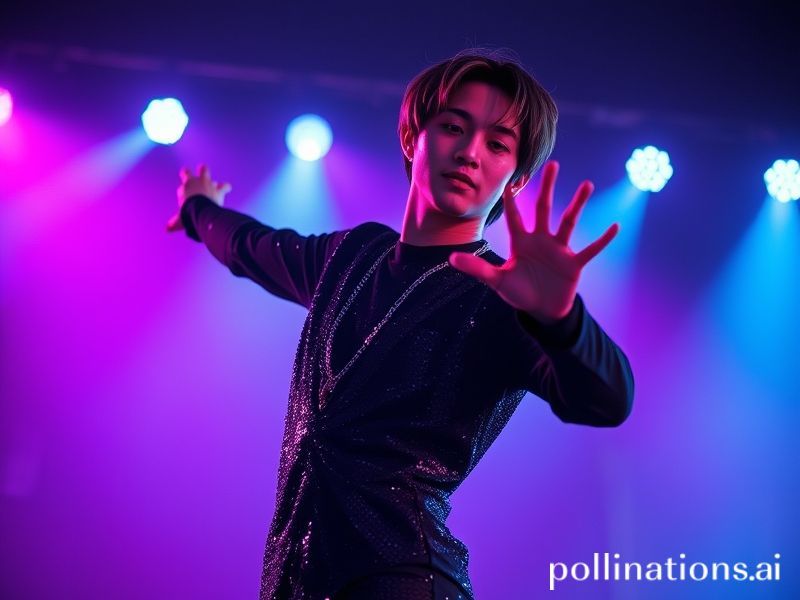Taemin Returns: How One K-Pop Idol Became the World’s Shared Pause Button
Taemin, the Eternal Boy Who Outlived the End of the World (and Still Dances in the Ashes)
The calendar says 2024, but somewhere in a Seoul rehearsal studio the clock stopped on 26 May 2022 and has been tap-dancing in place ever since. That was the day SHINee’s youngest—legal adult, eternal sprite, industry-wide cautionary tale about the side effects of too much charisma—walked through the army gates and vanished into the Korean conscription machine. Two years, one pandemic, three regional wars, and a global nervous breakdown later, he re-emerged last week, hair regulation-short, salute crisp, eyes still doing that thing where they look straight through the camera and into your browser history. The planet, meanwhile, is still smoldering. Taemin, bless his enlistment-shrunken fatigues, simply pressed “resume.”
International correspondents usually file from Donbas or the South China Sea; we find ourselves instead in front of a bubble-pink comeback countdown that feels equally apocalyptic. Why does the return of a 30-year-old pop sprite matter when glaciers are resigning en masse? Because Taemin has become a rare shared coordinate in the fractured GPS of global culture. The Japanese fashion houses, the Brazilian dance crews, the French choreographers who can’t pronounce “Guilty” without adding an existential shrug—everyone uses him as a benchmark for “still trying.” In a marketplace where virality is measured in half-lives shorter than fruit flies, his brand of meticulous despair is practically medieval craftsmanship.
Consider the numbers. During his service, Spotify clocks registered 2.7 billion streams for a man who officially released zero new songs. That’s the sonic equivalent of phantom limb pain, except the limb is doing body waves in your basement. Meanwhile, the South Korean government—ever the sentimental capitalist—issued commemorative stamps featuring Taemin mid-spin, thereby allowing civilians to lick the back of his head for the price of domestic postage. Even North Korea’s state mouthpiece got in a jab, calling K-pop conscripts “capitalist military theatre,” which is rich coming from a country that stages mass games with the emotional range of a funeral director on deadline.
The broader significance? Taemin is the canary that learned choreography. His enlistment was sold as a routine civic duty, but in practice it functioned like a global pause button on the idol economy’s most efficient perpetual-motion machine. With him gone, labels scrambled to clone his ghost: AI-generated dance breaks, holographic fan meets, NFT photocards that promised “exclusive eye-contact” (yours for 0.03 Ethereum and whatever remains of your dignity). Nothing stuck. The industry discovered, to its horror, that you can 3-D print abs, but you cannot 3-D print yearning.
His discharge therefore feels less like a return and more like a system reboot for a planet that briefly forgot how to be tender. In Ukraine, soldiers queued the “Move” choreography between drone sorties; in Tehran, protestors translated “Criminal” into Persian graffiti; in Wisconsin, a middle-school teacher got suspended for teaching the “Want” knee-slide during active-shooter drill—America, in its own tasteless way, showing devotion. Each instance proves that soft power doesn’t always come with aircraft carriers; sometimes it’s a 174-bpm track about obsessive love with a bridge that sounds like heartbreak doing calculus.
And yet the cynic’s question lingers: what does Taemin actually owe this scorched earth? Another meticulously shot MV where he dances alone in an abandoned mall that looks suspiciously like our collective future? Another world tour sponsored by a car company promising to go carbon-neutral by 2070, pinky swear? The answer, delivered with the dry grin of someone who’s read the fine print on Doomsday, is: probably. Because the alternative—silence—is already streaming in lossless quality on every news feed.
So here we are, international spectators huddled around the comeback trailer like cavemen around fire, grateful for the warmth even as the smoke alarms of reality keep shrieking. Taemin steps back onto the stage, the globe keeps tilting toward chaos, and somewhere in between a billion phones light up with the same notification: “TAEMIN IS BACK.” It isn’t salvation, but in 2024 we’ll take choreography over surrender. After all, if the end is nigh, we might as well practice our footwork.







